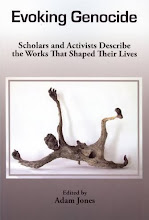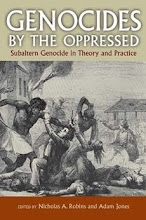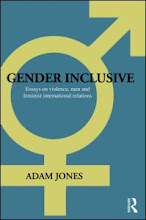"Genocide" Text Points to Limits of Polish-Russian Reconciliation
By Andrew Rettman
EUObserver.com, May 12, 2010
"[European Union] MEPs have watered down a statement on the Soviet Union's killings of Polish officers in 1940 amid underlying tensions between Warsaw and Moscow. The communique by the EU-Russia inter-parliamentary delegation was adopted on Tuesday (11 May) and said in reference to the fateful flight in April of the late Polish president Lech Kaczynski: 'The presidential plane was carrying a delegation to Katyn, to commemorate a war crime having the character of genocide.' The first draft of the text, penned personally by Polish MEP Marek Migalski, who hails from the late president's right-wing Law and Justice party, had said more forcefully that the 1940 killings were 'genocide.' Other deputies, including the delegation chairman, German centre-left MEP Knut Fleckenstein, forced the alteration. ...
Mr. Migalski's first draft goes beyond what has been said on Katyn by the Polish sejm, by the Polish president of the EU parliament, Jerzy Buzek, and by Russian authorities. He was sanguine about the change, saying: 'For me, there's no great difference. If something "has the character" of genocide, then it's the same thing as calling it "genocide."' He intends to push for another Katyn statement at the level of the Brussels plenary assembly, however. Mr. Fleckenstein believes the change is important and says further statements are not needed: 'It's up to the European Court of Human Rights in Strasbourg to decide if Katyn was a genocide or not. The ruling is pending and we should wait.' The difference in approach is illuminating at a time when many commentators in western Europe predict a rapprochement in Polish-Russian relations on the back of the Kaczynski tragedy, but observers in Poland see a lot of unfinished historic business. [...]"
Thursday, May 13, 2010
Subscribe to:
Post Comments (Atom)














The purpose of this comment is not to excuse, in any way, Beria, Stalin or other Soviet authorities from moral judgement on these crimes, practiced in secret and hidden from the Russian people, hidden even from most "believers" in the Soviet regime, for 50 years. However, history must be written in a true manner, and we will not be honoring the dead if we do not tell the whole truth.
ReplyDeleteArticle 2 of the convention on the Prevention and Punishment of the Crime of Genocide defines genocide as "any of the following acts committed with intent to destroy, in whole or in part, a national, ethnical, racial or religious group, as such: killing members of the group, [...]"
The definition of genocide does not include political crimes, or mass political crimes. There are obvious historical difficulties in the extension of the concept to political crimes. Most of these political mass murders were carried out in civil wars, inside the same ethnical group. We would have to consider events during the American and French revolutions, some of them carried out by the revolutionaries, as genocide.
With regard to Katyn, the Soviets captured between 250,000 and 454,700 soldiers of the Polish army. About 250,000 were set free by the army almost on the spot, while 125,000 were delivered to the NKVD. The NKVD, in turn, quickly released 42,400 soldiers. All of the released were mostly soldiers of Ukrainian and Belarusian ethnicity serving in the Polish army. The 43,000 soldiers born in West Poland, then under German control, were transferred to the Germans. By November 19, the NKVD had about 40,000 Polish POWs, of which 8,500 were officers, but also 25,000 soldiers. Once at the camps, from October 1939 to February 1940, the Poles were subjected to lengthy interrogations and constant political propaganda by NKVD officers. The prisoners assumed that they would be released soon, but the interviews were in effect a selection process to determine who would live and who would die. According to NKVD reports, if the prisoners could not be induced to adopt a pro-Soviet attitude, they were declared "hardened and uncompromising enemies of Soviet authority." On 5 March 1940, following a note to Stalin from Beria, Stalin and other three members of the Politburo signed an order to execute 25,700 Polish "nationalists and counterrevolutionaries"
As the documents show, the motive for the Katyn massacre was to deprive eastern Poland of politically hostile (to the Soviet ideology) influent polish people, particularly military, who would predictabilly mount political and armed opposition to the Soviet regime.
The strong moral condemnation of this massacre comes from the fact that it was not the direct result of chaotic revolutionary events, but the premeditated act of an established administration, done in the name of Soviet ideology but, at the same time, carefully hidden from the majority of the believers in that ideology. It is a crime born of the failure and deceit of a state ideology. We won't be able to understand Katyn if we think of it as genocide.
Genocide is always supported by racist ideology, and thus is mostly supported by many os the people of the "superior" race or religion.
I appreciate your thoughtful contribution, but I question your reading of the Genocide Convention. Destroying social/political elites clearly meets the Convention requirement of "destruction of a national ... group" (here, ethnic Poles) "in whole or in part" (here, the "part" was the social elite). What is termed "eliticide" -- a sub-strategy of genocide -- is a classic approach followed in many other widely-recognized genocides: e.g., the Armenian catastrophe beginning in 1915; the Nazis in Poland in 1939-40; Burundi in 1972; and Cambodia from 1975 to 1978 (where intellectuals and "bourgeois" elements were particular targets).
ReplyDeleteI see your point, and it is surely a valid one from the point of view of penal law. For a victim, the end result of (my restricted sense of) genocide or any other form of ideologically motivated mass murder is the same. Therefore, these massacres should be dealt in the same way by international law. Deliberate acts of an administration of a country of that sort, particularly the ones done in secrecy, without some degree of support by the people, should get the highest moral condemnation and dealt accordingly by international law.
ReplyDeleteI must reafirm I find the Katyn massacre worst than a (strictly racial) genocide, and generaly much worst than the mass murders that may accompany revolutionary events.
As I said, Katyn is a crime born of the failure and deceit of a state ideology. Historians won't be able to understand Katyn if they don't see its roots in a "people's liberation" ideology that, by the late 1930's, had failed to live up to its promisses. Many segments of the soviet elite, including some of the tzarist elites that were absorbed by the bolsheviks during the revolutionary events, but following Stalin's rise to absolute power were showing signs of doubt or discomfort, were being murdered by Beria's boys at appalling rates. To explain Katyn, from an historical point of view, it is important to understand it as a part of the bigger picture that it is a part of.